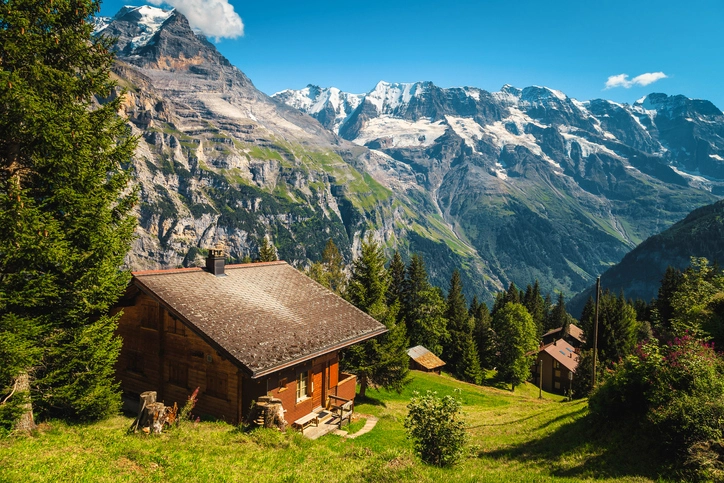Switzerland is not only a popular tourist destination, but also an attractive place for many who wish to register their secondary home in this beautiful country for professional or private reasons. Whether you want to move into a second home in Switzerland as a cross-border commuter, student, vacation home owner or for other reasons: You can find out everything you need to know about registration and the associated legal regulations here.
- Secondary residence in Switzerland – when to register
- Secondary residence as a Swiss national
- Secondary residence as a foreigner
- Taxes and second home in Switzerland
- Obligation to register and home country ID card
- Second homes initiative and its effects
1. Secondary residence in Switzerland – when is it necessary?
In Switzerland, the so-called «unit of residence» applies. This means that there is only one actual place of residence – your main place of residence. This is where you live and spend most of the year. Strictly speaking, the often-cited «second residence» does not exist in the legal sense; the correct term would actually be «secondary residence».
In principle, all persons are registered in their relevant municipality either as «established residents» (main residence) or as «residents» (secondary residence).
However, the distinction between main residence and secondary residence is not always easy to make and often has to be reviewed on a case-by-case basis.
Before you start registering your secondary residence in Switzerland, you should clarify whether this is even necessary. As a rule, this is the case if you commute between your place of residence in Switzerland or in another (EU) country and your place of work or study in Switzerland for professional or educational reasons.
Weekly residents and cross-border commuters
If you stay in Switzerland during the week to work or study and only return to your primary residence at the weekend or on vacation and public vacations, you are considered a «weekly resident». If you commute daily between your workplace in Switzerland and your place of residence abroad, you are a cross-border commuter. In this case, of course, you do not have to register a secondary residence, as you only work in Switzerland but do not live there.
Vacation home as secondary residence
In addition to professional or educational reasons, a second place of residence can also be registered for vacation reasons. This applies, for example, if you buy a vacation apartment or a vacation home in Switzerland that you only live in at weekends, for example.
The vacation home or vacation apartment would then be a classic «secondary residence», as you spend the majority of your life in your primary residence.
Your center of life
The decision as to whether you have to register a residence as your main or secondary residence often depends on the duration of your stay. If you stay there permanently, or at least spend a large part of the year there, this place is considered your main residence, as it is the center of your life.
Your center of life, i.e. the place where you spend the majority of your life, can have a significant impact on your tax situation and settlement permit. Switzerland expects its residents to maintain the unity of their residence, which means that your main residence should be in Switzerland if you are staying here for a longer period of time.
Last but not least:
Finally, it is important to know that Switzerland has passed a second-home initiative in the past, which is intended to limit the number of second homes in certain regions. This may affect the registration of your secondary residence, as some areas are subject to certain restrictions. Therefore, always observe the separate residence permit and the obligation to register your secondary residence.
2. Secondary residence as a Swiss national

For all Swiss nationals, the municipality in which they have deposited their certificate of origin is considered to be their main place of residence, which is therefore considered to be their «municipality of establishment». The so-called «Heimatausweis» , on the other hand, is deposited in the municipality of residence (secondary residence), which was issued by the municipality of establishment. This means that the certificate of origin and the residence permit are two different documents that should not be confused.
To register a secondary residence as a Swiss national, the following points must apply:
- The stay at the secondary residence is a so-called «weekly stay». This means that you only stay at this place of residence for a limited period of time and for a specific activity (e.g. study, work, etc.).
- The duration of the stay is at least three consecutive months or three months in total per year.
- There is no intention of permanent residence.
3. Secondary residence as a foreigner
If you would like to register a secondary residence in Switzerland in addition to your foreign residence, there are a few important steps to follow. First of all, you need to know that Switzerland has a so-called «Second Home Act » for the registration of second homes. This law regulates the conditions and requirements under which you can register your secondary residence in Switzerland.
As a rule, you must register with the municipality in which your second home is located. The municipal administration will help you to fill out the necessary forms and provide the required documents. As the exact requirements may vary depending on the municipality, it is advisable to check with the relevant authority in advance. The municipality concerned will also check whether you, as a foreign national, require a residence permit or – for work purposes – a work permit, and the municipality that issued your residence permit or settlement permit is generally considered your main place of residence.
If you come from an EU country, there are special regulations that can make your stay in Switzerland easier. However, EU citizens are also required to register their secondary residence and comply with the 14-day deadline.
Please note: If you only work in Switzerland and return to your place of residence abroad after work, you are considered a so-called «cross-border commuter» and are not entered in the residents› register.
4. Taxes and secondary residence in Switzerland

The topic of taxes plays a decisive role when it comes to registering a second home in Switzerland.
As a second home owner in Switzerland, you will be confronted with the imputed rental value. This is a notional rental value of your second home, which is included in the calculation of your income tax. It is advisable to seek expert tax advice for this, as the tax laws in Switzerland can be complex. This particularly affects non-residents who have a second home in Switzerland.
The regulations and requirements may vary slightly depending on the region of Switzerland in which you wish to register your second home. In cities such as Zurich, Geneva or Basel, which are considered economic centers in Switzerland, housing prices and rents could be higher and therefore the tax payable could also be higher. In more rural regions, such as Ticino, the costs may be lower, but the quality of life is just as high.
If you purchase a vacation home as a second home, special regulations apply, as such properties are often only used for vacation purposes. In this case, it is important to be aware of how often and for how long you live in your vacation home, as this may affect the taxation and requirements for your second home. Vacation properties are popular in Switzerland, both among Swiss and foreign nationals.
5. Registration obligation and home country ID card
The obligation to register is an important aspect of registering a second home in Switzerland. Swiss nationals are obliged to register their place of residence with the relevant municipality within 14 days of moving in.
Foreign nationals living in Switzerland are also obliged to register their place of residence and are often granted a residence permit if they meet the necessary criteria.
A Heimatausweis or Heimatschein is a document that confirms that you belong to a specific municipality in Switzerland. This document is of great importance for Swiss nationals and can be applied for if required. It also serves to confirm your main residence in Switzerland.
If you decide to register your secondary residence in Switzerland, you should also consider how long you plan to stay in Switzerland. Staying in Switzerland permanently may affect your tax situation and your residence permit. It is therefore important to clearly define your plans and intentions and seek professional advice if necessary.
It is also important to observe the formalities in connection with a possible move out of Switzerland. Certain regulations may apply to the deregistration of your place of residence and the handling of tax matters.
6. Second home initiative and its effects
The second-home initiative was introduced in Switzerland in 2012 to limit the number of second homes in certain regions and thus curb urban sprawl.
This may have an impact on the registration of your secondary residence, as there are specific restrictions in some regions. The aim of this initiative is to ensure the preservation of the quality of life in the affected communities and to regulate the negative impact of vacation properties.
The implementation of this initiative may make it more difficult to register second homes, especially in popular tourist regions. It is advisable to find out in advance about the current laws and regulations in the region in which you wish to register your second home.
Conclusion:
In summary, it can be said that the registration of a secondary residence in Switzerland depends on various factors and that it is important to consider the specific regulations and requirements in each individual case.
Switzerland offers a wide range of opportunities for people who wish to register their second home here for professional, academic or personal reasons. However, it is crucial to observe the relevant legal regulations and tax rules in order to avoid potential conflicts and to avoid problems with the residents› registration office or the tax office.

Leave a Reply